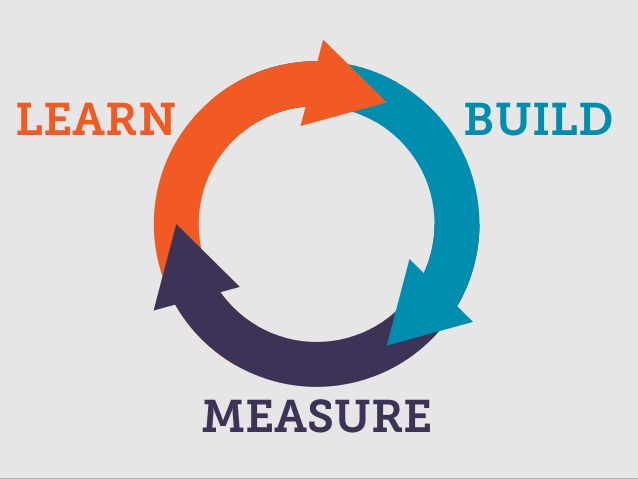The Lean Startup is a methodology popularized by author and Entrepreneur, Eric Reis. He is the author of the New York Times bestseller, The Lean Startup: How Today’s Entrepreneurs Use Continuous Innovation to Create Radically Successful Businesses. A Lean Startup applies lean methodology thinking by constantly testing business hypotheses, releasing products iteratively, and validating learning in the marketplace. Lean Startup is the application of lean thinking to the process of innovation. 1
The value in a startup is not the creation of stuff, but rather validated learning about how to build a sustainable business.
The Lean Startup provides a scientific approach to creating and managing startups and getting the desired product to customers’ hands faster. A startup is a human institution designed to create a product or service under conditions of extreme uncertainty. Lean is about putting a process, a methodology around the development of a product. 1
Eric Reis describes the lean startup methodology, frameworks for building a sustainable business model, and strategies for creating innovative products, in his book: The Lean Startup. Reis explained concepts such as the minimum viable product (MVP), the build-measure-learn feedback loop, validated learning, innovation accounting among others.
The Root of Lean Thinking
The Lean Startup takes its name from the lean manufacturing revolution that Taiichi Ohno and Shigeo Shingo are credited with developing at Toyota. Lean thinking is radically altering the way supply chains and production systems are run. Among its tenets are drawing on the knowledge and creativity of individual workers, the shrinking of batch sizes, just-in-time production and inventory control, and an acceleration of cycle times. It taught the world the difference between value-creating activities and waste and showed how to build quality into products from the inside out.
The Lean Startup adapts these ideas to the context of entrepreneurship, proposing that entrepreneurs judge their progress differently from the way other kinds of ventures do. Progress in manufacturing is measured by the production of high-quality physical goods.
Inspired by lessons from lean manufacturing. Lean Startup relies on “validated learning,” rapid scientific experimentation, as well as a number of counter-intuitive practices that shorten product development cycles, measure actual progress without resorting to vanity metrics, and learn what customers really want.
Startups that succeed are those that manage to iterate enough times before running out of resources.—Eric Ries
According to Reis, there are five principles of the lean startup:
- Entrepreneurs are everywhere.
You don’t have to work in a garage to be in a startup. A startup is a human institution designed to create new products and services under conditions of extreme uncertainty. That means entrepreneurs are everywhere and the Lean Startup approach can work in any size company, even a very large enterprise, in any sector or industry. - Entrepreneurship is management.
A startup is an institution, not just a product, and so it requires a new kind of management specifically geared to its context of extreme uncertainty. Entrepreneur should be considered a job title in all modern companies that depend on innovation for their future growth. - Validated learning.
Startups exist not just to make stuff, make money, or even serve customers. They exist to learn how to build a sustainable business. This learning can be validated scientifically by running frequent experiments that allow entrepreneurs to test each element of their vision. - Build-Measure-Learn.
The fundamental activity of a startup is to turn ideas into products, measure how customers respond, and then learn whether to pivot or persevere. All successful startup processes should be geared to accelerate that feedback loop. - Innovation accounting.
To improve entrepreneurial outcomes and hold innovators accountable, we need to focus on the boring stuff: how to measure progress, how to set up milestones, and how to prioritize work. This requires a new kind of accounting designed for startups—and the people who hold them accountable. 2
The Lean Startup Movement
Entrepreneur and customer development methodology creator Steve Blank, one of the early pioneers of lean thinking for entrepreneurship, echoed the thoughts of Reis in his 2013 HBR article titled “Why the Lean Start-Up Changes Everything”. A Lean Startup is a temporary organization designed to search for a repeatable and scalable business model. It is a methodology for developing businesses and products that aims to shorten product development cycles and rapidly discover if a proposed business model is viable. 3
A lean startup searches for a repeatable scalable business model through rapid experimentation, iterative product releases, and validated learning.
Ash Maurya, the founder of LEAN STACK and creator of the one-page business modeling tool “Lean Canvas“, describes a systematic process for implementing a lean startup in his book, Running Lean: Iterate from Plan A to a Plan That Works.
“Running Lean is a systematic process for iterating from Plan A to a plan that works, before running out of resources.”
Ash described a three-step plan for running lean
- Document Your Plan A
- Identify the riskiest parts of your plan.
- Systematically test your plan.
While a strong vision is required to create a mantra and make meaning, a Lean Startup strives to uphold a strong vision with facts, not faith. It is important to accept that your initial vision is built largely on untested assumptions (or hypotheses). Running Lean helps you systematically test and refine that initial vision.
Customers buy from you when they trust you can solve their problems. Investors bet on you when they trust you can build a scalable business model. Startups are a risky business, and our real job as entrepreneurs is to systematically de-risk our startups over time.
Looking to build your successful tech Startup? Join our 12-week cohort of tech startups for Black founders by Black industry experts.
